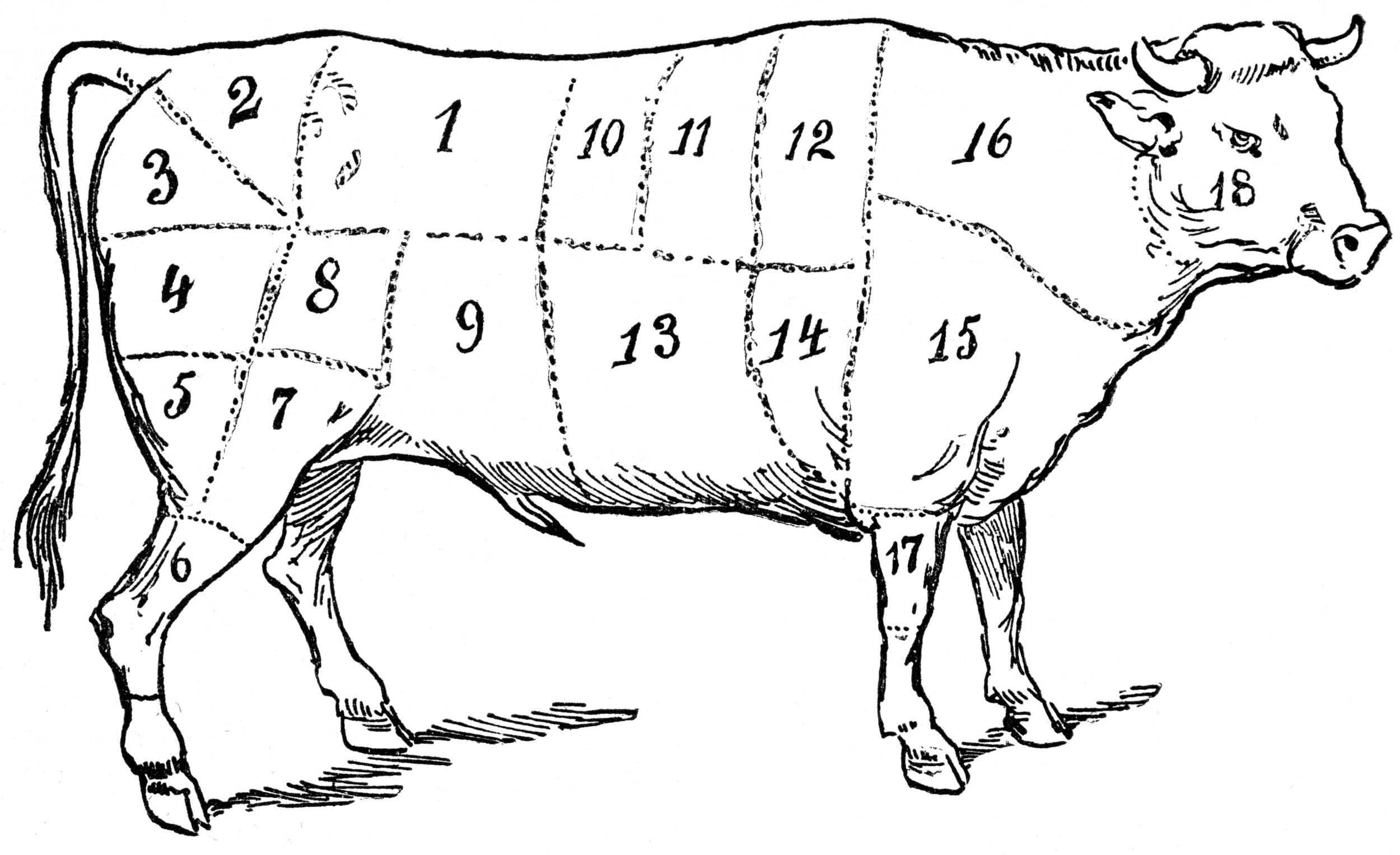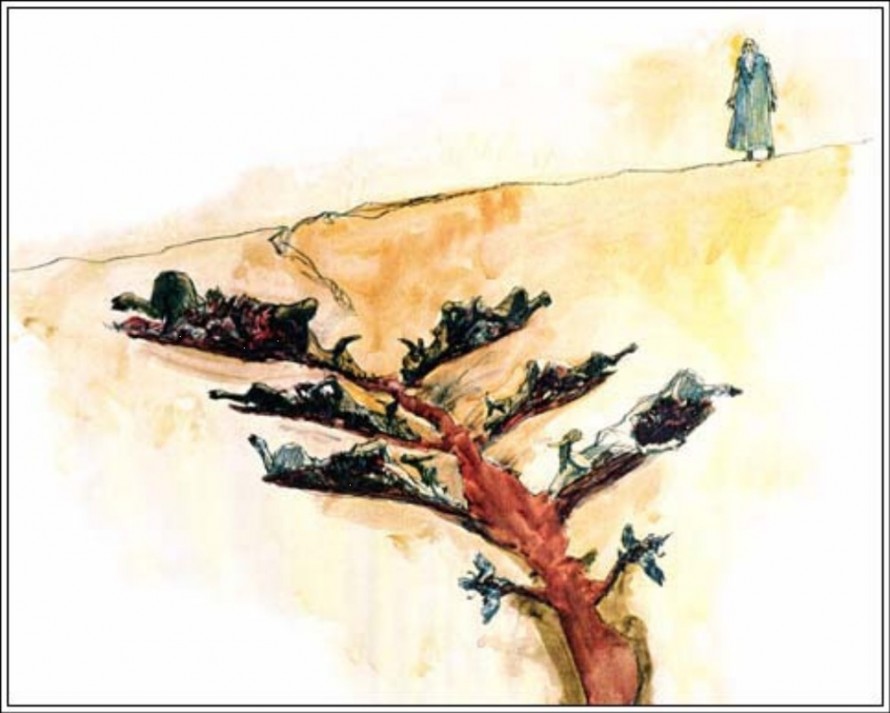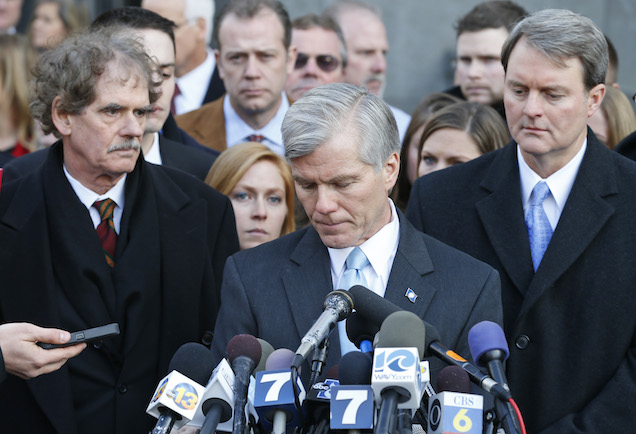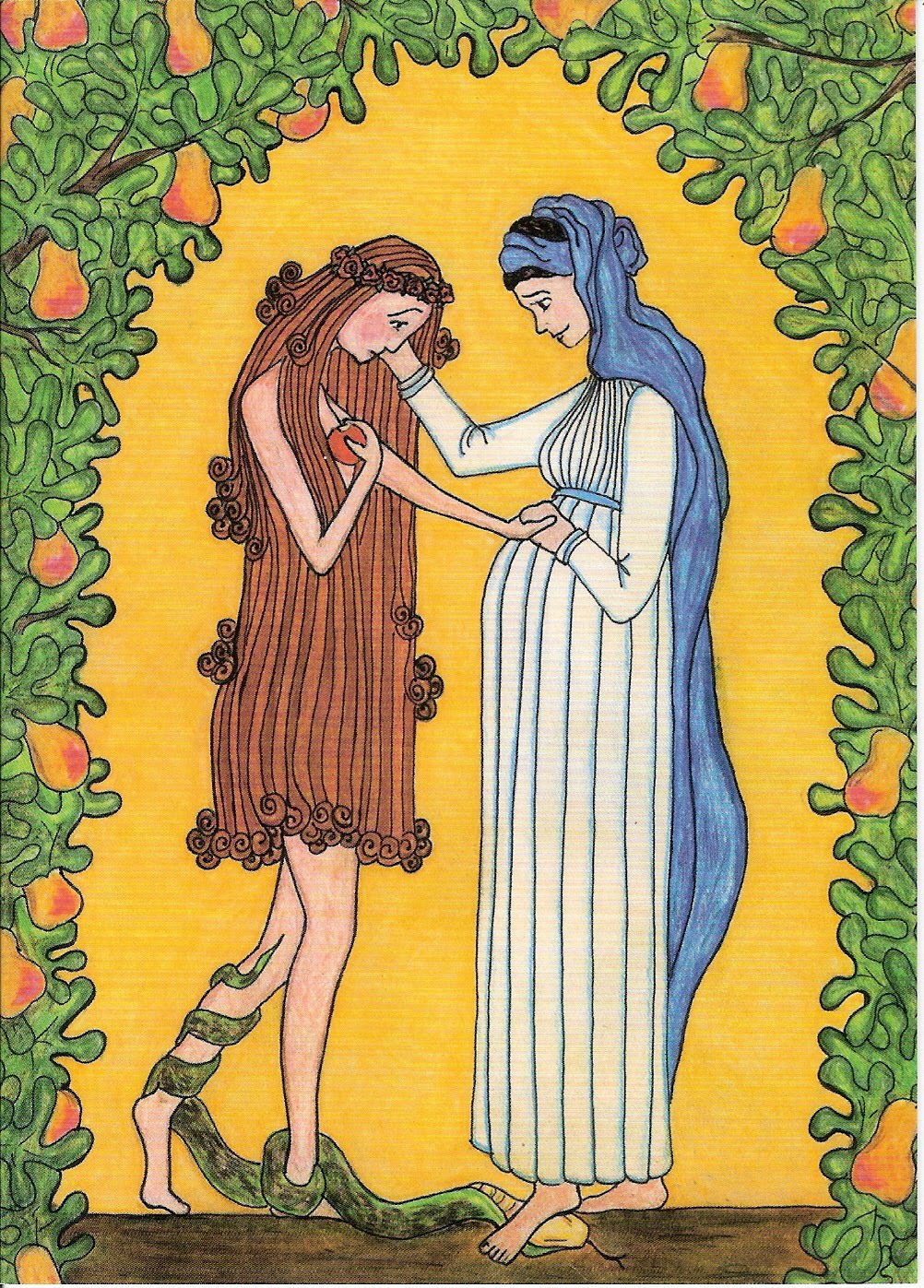Why Did God Permit the Charleston Murders?
We don't know. "We don't know" is the honest answer to any question about why God permitted Dylan Roof to murder the Charleston Nine. No one knows. But though we will never have a definitive answer this side of the grave, a strange parable Jesus tells does offer an interesting perspective on the perennial "Why?" we ask whenever innocent people suffer.
Today's Eat This Book Portion
The?Eat This Book campaign?at my church provides folks a scripture reading schedule to follow. Right now, we are reading through the Gospel of Matthew (about a half chapter a day), and today's reading comes from Matthew 13, one of my favorite passages in scripture. Reading the strange parable of the wheat and the weeds this morning has got me thinking about last week's murders in Charleston.
The Wheat and the Weeds
 Surrounded by a crowd by the shore of the?Sea of Galilee one day, Jesus told the following parable:
Surrounded by a crowd by the shore of the?Sea of Galilee one day, Jesus told the following parable:
??The kingdom of heaven may be compared to someone who sowed good seed in his field;?but while everybody was asleep, an enemy came and sowed weeds among the wheat, and then went away.So when the plants came up and bore grain, then the weeds appeared as well.And the slaves of the householder came and said to him, Master, did you not sow good seed in your field? Where, then, did these weeds come from???He answered, An enemy has done this. The slaves said to him, Then do you want us to go and gather them???But he replied, No; for in gathering the weeds you would uproot the wheat along with them.Let both of them grow together until the harvest; and at harvest time I will tell the reapers, Collect the weeds first and bind them in bundles to be burned, but gather the wheat into my barn....??Then he left the crowds and went into the house. And his disciples approached him, saying, Explain to us the parable of the weeds of the field.?He answered, The one who sows the good seed is the Son of Man;the field is the world, and the good seed are the children of the kingdom; the weeds are the children of the evil one,?and the enemy who sowed them is the devil; the harvest is the end of the age, and the reapers are angels.Just as the weeds are collected and burned up with fire, so will it be at the end of the age.The Son of Man will send his angels, and they will collect out of his kingdom all causes of sin and all evildoers,?and they will throw them into the furnace of fire, where there will be weeping and gnashing of teeth.Then the righteous will shine like the sun in the kingdom of their Father. Let anyone with ears?listen!'"(Matthew 13:24-30, 36-43)
Parables are meant to unsettle, to make you think. So go read this strange parable again, slowly. (In other words, don't scan the way you normally do on the Internet.)
Some Quick Observations
- Jesus points out that evil and good are so tightly mixed together in this world that no man or woman can perfectly separate one from another. I know this is true, because I know it is true in me.
- Jesus reminds us that, though evil seems to be growing stronger, so is good. This is an evil world, but evil is not stronger than good.
- Jesus says that, this side of Judgement Day, it is impossible to root up all the evil in the world without also destroying the good. For reasons only known to God, if there is to be good in the universe, there must also be the freedom for evil.
- Jesus makes it very clear that evil, though it seems strong today, will one day be utterly destroyed by God.
Let Me Know What You Think
I?find this parable strangely comforting. What about you? What do you think this parable is about, and how might it relate to the evil that was done in Charleston last week?
Did the Resurrection Really Happen?
Did the Resurrection actually happen? The Apostle Paul, writing in sometime in the 50's A.D., had this to say: "If Christ has not been raised, our preaching is useless and so is your faith" (1 Corinthians 15:14). In other words, Christianity rises and falls with the Resurrection of Jesus. But, the issue for many modern people is that though the Resurrection seems like a nice story, we know that dead people stay dead and that it couldn't possibly have happened. So, did the Resurrection happen, or not? I think it did, and here are three reasons why.
(By the Way: It Wasn't a Spiritual or Emotional Resurrection)
As a way around the difficulty of the Resurrection, some people say that what the Gospels report is some kind of spiritual or emotional sense that Jesus was still with his disciples after his death. This view does not at all match what the Gospels themselves say, namely that after the Resurrection:
- Jesus ate food (Luke 24:13-32 & John 21:1-14) and
- Jesus made physical contact with the disciples (Luke 24:36-43 and John 20:24-29).
The Gospels are very clear: the Resurrection was a bodily resurrection, and not a vague spiritual sense that Jesus was still alive.So, what reasons do we have to believe that the Resurrection happened?
Reason 1: The Women Witnesses
All the canonical Gospels agree that the first witnesses to the empty tomb and the Resurrection of Jesus were women. In our world, that detail doesn't surprise us, but in the ancient world this would have been a shocking detail because women weren't considered reliable witnesses in the ancient world.If you were making up a resurrection hoax in the 1st century Mediterranean world, you would never say that women were the first witnesses of your story. So, why do all the gospels insist that women were the first witnesses?The simplest reason for the inclusion of the women witnesses: because the Gospels are merely reporting what actually happened. The inconvenient truth of the women witnesses is a detail that argues for the plausibility of the Resurrection.
Reason 2: The Deaths of All Involved
Many people have died for lies that they believed were true, but groups of people do not die for what they know is a lie.Virtually all the disciples of Jesus were martyred for their faith in him. If they were making up the Resurrection, then they would have recanted their stories at the point of death. But they didn't. Chuck Colson, one of the Nixon men involved in the Watergate break-in, had this to say:
Chuck Colson, one of the Nixon men involved in the Watergate break-in, had this to say:
I know the resurrection is a fact, and Watergate proved it to me. How? Because 12 men testified they had seen Jesus raised from the dead, then they proclaimed that truth for 40 years, never once denying it. Every one was beaten, tortured, stoned and put in prison. They would not have endured that if it weren't true. Watergate embroiled 12 of the most powerful men in the world-and they couldn't keep a lie for three weeks. You're telling me 12 apostles could keep a lie for 40 years? Absolutely impossible.
Chuck Colson
The martyrdom of the early Christians is a strong argument in favor of the truth of their claims.
Reason 3: It Was Testimony, Not Legend
Modern people will say that the Resurrection is a legend, a folktale that took shape over generations and that consequently grew in the telling, like George Washington and the Cherry Tree.The problem with this theory is that it doesn't fit the facts: the letters of Paul began to be circulated around 20 years after the death of Jesus, the Gospel of Mark within 40 years, and the Gospels of Matthew, Luke, and John within 60 years (at the latest). In other words, Christians were publicly talking about the Resurrection within the lifetime of its witnesses. Anyone who wanted to investigate the truth of the Resurrection merely had to talk to its witnesses.A legend takes generations to develop, but the Gospels (and other New Testament materials) were written down and circulated within a generation or two of the events of that first Easter Sunday, i.e., way too soon a time for a legend to develop.Rather than being a legend, the Resurrection was testimony. Testimony is a valid form of historical memory. People who experienced the events say, "I was there. I saw it." January was the 70th anniversary of the liberation of Auschwitz, and there are thousands of people who lived through the Nazi concentration camps who can still testify today to their experience, 70 years later. One of the reasons Holocaust deniers have a hard time gaining a hearing is because there are people who can point to their blue tattoos and say, "No, it did happen: I was there."
Testimony is a valid form of historical memory. People who experienced the events say, "I was there. I saw it." January was the 70th anniversary of the liberation of Auschwitz, and there are thousands of people who lived through the Nazi concentration camps who can still testify today to their experience, 70 years later. One of the reasons Holocaust deniers have a hard time gaining a hearing is because there are people who can point to their blue tattoos and say, "No, it did happen: I was there." Just as the remaining Holocaust survivors' testimony is available to anyone wanting to investigate the Holocaust today, so the Resurrection witnesses' testimony was available to anyone wanting to investigate the Resurrection at the time that the New Testament was taking shape.
Just as the remaining Holocaust survivors' testimony is available to anyone wanting to investigate the Holocaust today, so the Resurrection witnesses' testimony was available to anyone wanting to investigate the Resurrection at the time that the New Testament was taking shape.
Conclusion: the Resurrection is Plausible
The Resurrection cannot be proved in a laboratory. But, we can examine the facts and decide that it is more plausible that the Resurrection happened than that it did not happen.Now, some people will accept the above and yet still insist: "We know that dead people stay dead, and therefore the Resurrection could not have happened." The problem with that position is that history is full of events that seemed impossible and that actually happened. I admit that the Resurrection is unique as an historical event, but that doesn't mean that it is necessarily impossible. In any historical inquiry, we have to look at the evidence and see where it takes us. In this case, I believe the evidence argues in favor of the Resurrection.The reason discussions like this are important are not because they can bring anyone across the threshold of faith (only God can do that), but because I've found that some people won't even approach the door of faith if they believe that the claims of the faith cannot possibly be true; arguments can't cause someone to believe, but they can knock down bad reasons for not believing.Here's hoping this little post might help someone somewhere come a bit closer.
Take the Abraham Quiz
The Bible is mysterious and difficult, but it's not impossible. With a little bit of background knowledge about the ancient cultures of the Bible, ordinary people like you and me can learn to read scripture in such a way that even some of its mysterious parts offer important insights. Below is a bit of background information about a very strange episode in Genesis. Read the background, take the quiz, and let me know what you think.!["Butcher's Shop," by Annibale Carracci, 1580 [Wikipedia]](http://static1.squarespace.com/static/5d70f59aefca59000162e4e6/5d7fcef39f682762992c8aca/5d7fcf019f682762992c8c60/1568657153717/Annibale_Carracci_-_The_Butchers_Shop_-_Google_Art_Project.jpg?format=original)
You "Cut" a Covenant
In the ancient middle east, the way 2 parties formalized an agreement was through a covenant ceremony. In Hebrew, you "cut" a covenant, because covenants involved taking animals and sacrificing them, and then walking between the carcasses.
And Say, "I'll Become a Slaughtered Calf"
Here's the point: when you walked between the pieces of the slaughtered animals, you were saying, "May I become like these dead animals if I don't keep my end of the agreement."(I think our wedding ceremonies would be much more interesting and divorce much less frequent if we adopted the same practice....)
So, Abraham Gets Ready
In Genesis 15, Abraham, on the Lord's instructions, prepares one of those covenants:
The Lord said to Abraham, Bring me a heifer three years old, a female goat three years old, a ram three years old, a turtle-dove, and a young pigeon.?10He brought him all these and cut them in two, laying each half over against the other; but he did not cut the birds in two.11And when birds of prey came down on the carcasses, Abram drove them away." [Genesis 15:9-11]
It's obvious what will happen next: Abraham will pass between the carcasses, showing his commitment to the Lord's plan.
But Something Strange Happens
But, that's not what happens:
12?As the sun was going down, a deep sleep fell upon Abram, and a deep and terrifying darkness descended upon him....17When the sun had gone down and it was dark, a smoking fire-pot and a flaming torch passed between these pieces.18On that day the?Lordmade a covenant with Abram, saying, To your descendants I give this land, from the river of Egypt to the great river, the river Euphrates,?19the land of the Kenites, the Kenizzites, the Kadmonites,?20the Hittites, the Perizzites, the Rephaim,?21the Amorites, the Canaanites, the Girgashites, and the Jebusites." [Genesis 15:12, 17-21, my emphasis].
Take the Quiz: What Does Genesis 15:17 Mean?
What's the point of the covenant ceremony recounted in Genesis 15? What does this mean?(Hint: The best way to read the Bible is to read backwards, i.e., to read the Old Testament in light of what we have in the New Testament. To put it another way, use Jesus as the interpretive key. In light of what the Church believes about Jesus, what's going on in Genesis 15?)
P.S. Subscribe
If you‘ve read this far, you?re committed, so why not subscribe to future updates from my blog? Click?here‘to subscribe.
3 Don'ts When Reading Genesis
Genesis is hard enough as it is; here are three things NOT to do when reading the first book of the Bible.
Don't Mistake "Is" for "Should"
Genesis is descriptive, not prescriptive, i.e., it describes the world as it is, not as it should be. Subsequent to The Fall described in chapter 3, every situation, family, and life is corrupted by sin. Abraham, Isaac, and Jacob are sinful men, and their families are a mess. Don't be surprised when great heroes of the faith turn out to be seriously flawed. And don't confuse descriptions of sin with approval of sin, even in the lives of the Patriarchs.The good news? God writes straight with crooked lines.
Don't Draw Conclusions Before the End
The Bible is not a series of disconnected stories; rather, it is one long drama in three acts, with a prologue at the beginning and an epilogue at the end:
- The Prologue: Genesis 1-11 (Creation, Fall, and the Flood)
- Act 1: Genesis 12 through the rest of the Old Testament (Covenant and Israel)
- Act 2: the Gospels (Jesus)
- Act 3: the book of Acts up through the present day (the Church)
- The Epilogue: the Book of Revelation (the End).
Each small story in the Bible fits into the larger whole. You wouldn't draw too many conclusions about the author of a story from the first page of a novel or the director of the movie from its first five minutes. In the same way, reserve judgment until you see how the story resolves. Yes, there are parts of the story that are troubling, but reserve judgment until you see where everything is going.
Don't Fill the Gaps with Suspicion
The Bible is filled with gaps. All we usually get are big broad strokes, and it's left to our imagination to fill in the gaps about why or how. For example, in the Genesis 4 account of Cain and Abel, why does the Lord God approve of Abel's gift but not Cain's? Isn't that rather arbitrary and unfair? Here's the true answer: no one knows why God preferred Abel's gift to Cain's. In the face of such a gap, then, we have to fill it with our own conjectures.Unfortunately, in the modern, cynical world, we are quick to fill gaps in the Bible with our own suspicions. But suspicion is a choice, and there is another approach:Don't fill gaps with suspicion; fill gaps with trust.It's true that deciding ahead of time to fill the gaps in the Bible with trust is a faith decision, but deciding ahead of time to read with a hermeneutic of suspicion is itself a faith decision. If you decide ahead of time that the Bible can't be trusted and that God is cynically setting up people for failure so he can punish them, then nothing you read will ever change your mind.A better way is to decide to fill the gaps in Genesis and elsewhere with trust and humility. Then, when you encounter things you don't understand, you'll admit what you don't know and assume that what you don't understand has a purpose in God's redemptive plan.
Here's the true answer: no one knows why God preferred Abel's gift to Cain's. In the face of such a gap, then, we have to fill it with our own conjectures.Unfortunately, in the modern, cynical world, we are quick to fill gaps in the Bible with our own suspicions. But suspicion is a choice, and there is another approach:Don't fill gaps with suspicion; fill gaps with trust.It's true that deciding ahead of time to fill the gaps in the Bible with trust is a faith decision, but deciding ahead of time to read with a hermeneutic of suspicion is itself a faith decision. If you decide ahead of time that the Bible can't be trusted and that God is cynically setting up people for failure so he can punish them, then nothing you read will ever change your mind.A better way is to decide to fill the gaps in Genesis and elsewhere with trust and humility. Then, when you encounter things you don't understand, you'll admit what you don't know and assume that what you don't understand has a purpose in God's redemptive plan.
P.S. What About the Bizarre Stuff in Genesis 6:1-4?
If you ever tried to read through Genesis, chances are that Genesis 6:1-4 caused you some trouble.
When people began to multiply on the face of the ground, and daughters were born to them,‘the sons of God saw that they were fair; and they took wives for themselves of all that they chose.Then the?Lord‘said, My spirit shall not abide?in mortals for ever, for they are flesh; their days shall be one hundred and twenty years.?The Nephilim were on the earth in those days?and also afterwards?when the sons of God went in to the daughters of humans, who bore children to them. These were the heroes that were of old, warriors of renown."-Genesis 6:1-4 [NRSV]
Here's the truth: nobody really understands this passage. Here's how Terence Fretheim puts is:
This brief segment is one of the most difficult in Genesis both to translate and interpret. Certain words are rare or unknown...; issues of coherence arise on many points. These verses may be a fragment of what was once a longer story, or scribes may have added to or subtracted from the text. The fact that the text presents ambiguity may be precisely the point, however: the mode of telling matches the nature of the message....
"Consistent with other sections in chaps. 1-11, this material reflects an era no longer accessible to Israel. [That is, the ancient Israelites who were the original readers of Genesis. --AF] The text does not mirror a typical human situation...but speaks of a time long past when God decreed a specific length to human life."
-Terence Fretheim, from?Genesis, in vol. I of?The New Interpreter's Bible
So, who are the mysterious "sons of God" mentioned in v. 2? Three options:
1. They are sons of Seth, mentioned in chapter 5, mixing with unbelievers.
2. "They may be royal or semi-divine figures who accumulated women in their harems" (Fretheim).
3. They are some kind of angelic beings. This seems most likely in context, and most troubling and bizarre to think about.
But, basically, as mysterious as this passage is, it fits with the larger context: before the Flood, things were going from bad to worse, spinning out of control.
The good news is that?Genesis 6:1-4 doesn't affect any important Christian doctrines or beliefs. (Which doesn't mean it isn't really strange.)
Lurking at the Door
Where did it go wrong with Bob McDonnell? Where does it go wrong with any of us? Beware thinking that you or I are aren't capable of the same things. And worse.
What Do You Do When You Want to Sin?
It's a question I've been asking recently: how does someone purposely refuse sin when it's sin that he wants to choose?It's easy to refuse sin when it's not what you want, but what about when sin's precisely what you most want?The one who wants to commit adultery?will choose adultery.The one who wants to steal will choose theft.The one wants to gossip will choose to spread the unkind word.The one who wants to murder will choose murder.At the moment when you are confronted with a sinful choice that you've already decided you want to take, it's too late.
The First Murder in the Bible
The first murder in the Bible is in Genesis 4, but before it happens, the LORD God warns Cain, "Sin is lurking at the door. It's desire is for you, but you must master it" [Genesis 4:7 NRSV].At some point, rather than fearing sin, Cain welcomed it, and was devoured.Cain murders Abel--his own brother--and murder has been part of the human story ever since.![[http://www.africadreamsafaris.com]](http://static1.squarespace.com/static/5d70f59aefca59000162e4e6/5d7fcef39f682762992c8aca/5d7fceff9f682762992c8c31/1568657151994/Lion-Hunt-4.jpg?format=original)
No One Is Safe
Bob McDonnell, former Governor of Virginia, was sentenced Tuesday to 2 years in Federal Prison on corruption charges. Bob McDonnell is a Christian and is?described by his family, associates, and political rivals as a good man. And yet for all that, Bob McDonnell made a choice to choose the sin that would devour him, but that choice wasn't at the specific moment that a political donor asked him for some special favors: it was way before that.At some point, Bob McDonnell made a choice to ignore small dishonest choices. And then those choices grew up.Sin starts small, but grows. There are sins in my life that if I ignore--or worse, deliberately attract--will devour me.Same goes for you.At the moment we are faced with the sin that will devour us, it's too late. The only way to be protected is to fight the sins early, when you don't want them and when they are small.
Kill It Early
The easy time to kill adultery is when the first thought of it appears, not when you're on‘the work trip with the co-worker you've been flirting and drinking with for 48 hours and whom you've been looking forward to sleeping with for several weeks. At that point, you?want to choose sin, and you will. At that point, sin's been lurking at your door a long time: its desire for you is probably much stronger than your desire to master it.You fight theft by attacking the obvious signs of greed in your life.You fight gossip by repenting of small harmful sentences you speak about others.You fight murder by being aware of your tendency to small bursts of indignance and superiority.
It's Lurking At Your Door
I'm not any better than anyone else. And neither are you. But for the grace of God, there we go.



![Emmanuel AME Zion Church member Kevin Polite helps members into the church for the service on 6/21/15 [David Goldman/Getty Images].](http://static1.squarespace.com/static/5d70f59aefca59000162e4e6/5d7fcef39f682762992c8aca/5d7fcf069f682762992c8d08/1568657158071/150621123102-02-charleston-church-service-0621-super-169.jpg?format=original)


